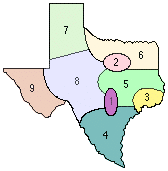UIL Speech Judges
If you have corrections, questions or comments regarding this information, please notify The UIL Speech and Debate department at speech@uiltexas.org or 512-471-5883.
Tyler Cole
Current high school:
None
Currently coaching?: No
Conference: N/a
Number of years coached: N/a
Number of tournaments judged: 0
High school attended:
Whitehouse High School
Graduated high school: 2014
Participated in high school: Yes
Participated in college: Yes
Judging qualifications:
I have 8 years in extemp and some form of debate (High School LD,CX, adn PFD as well as Collegiate LD, and NPDA). For interpenetration events I have about 3-4 years of competitive experience that I bring to the the ballot.
Additionally, I have judged at all levels of competition, in all events, with the high level being 2019 CX State.
Judging Philosophy
CX
Judging approach: Policy Maker
Policy priority: Communication skills are more important than resolution of substantive issues
Evidence philosophy: Quality of evidence is more important than quantity of evidence
Paradigm: I consider myself more of a traditional CX judge. If after the round the competitor can not defend their policy proposal then I will have no other choice but to vote for the other team. My ballot goes to the best policy proposal based on the evidence, and not the amount evidence. If you believe you are losing an evidential argument, do not continue to bring that argument up to prevent a drop on the ballot. I would much rather the competitor defend their plan using 1-2 pieces of solid winning arguments as opposed to using 4-5 pieces of losing. Dropping an argument on my ballot is not necessarily a drop in the round. However it will be beneficial to the team if they first say they are kick the argument, so that I know it was a deliberate and strategic drop. I believe that communication is above all the most important part of the debate process. If the competitor can not appropriately communicate their argument, then the veracity of the argument holds little weight in the round. I do allow competitors to spread, however I will not indicate if it is harming their communication. Spreading is a debate strategy, and strategies are all about risk, and there is no risk involved if your judge tells a competitor they are speaking to quickly.
LD
Approach: Communication skills are more important than resolution of substantive issues
Philosophy:
I consider myself extremely traditional judge when it comes to LD Debate. My ballot will always go to the value/criteria debate. As such, I want to see the value/criteria debate as much as possible. I like to see competitors extend the v/c beyond the initial setup. Be sure to use the v/c in not only the competitors own reasoning for use of specific pieces of evidence, but I would also like to see competitors use their v/c in their attack of the opponent's case and the opponent's own v/c. I believe that communication is above all the most important part of the debate process. If the competitor can not appropriately communicate their argument, then the veracity of the argument holds little weight in the round. I do allow competitors to spread, however I will not indicate if it is harming their communication. Spreading is a debate strategy, and strategies are all about risk, and there is no risk involved if your judge tells a competitor they are speaking to quickly
Contact Information
email: t.cole1996@gmail.com
cell: 903 7149840
office:
Availability Information
Meet types:
Invitational
District
Regional
CX State
State Meet
Congress Region
Congress State
Qualified for:
CX
LD
Extemp
Prose/Poetry
Congress
Travel
Region of residence:
1
I will travel to: 1 3 4 5 6 8







